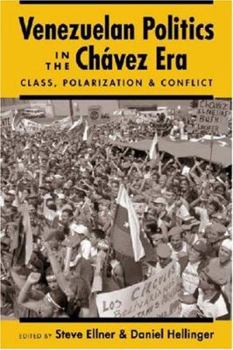Venezuelan Politics in the Chavez Era: Class, Polarization, and Conflict
The radical alteration of the political landscape in Venezuela following the electoral triumph of the controversial Hugo Chavez calls for a fresh look at the country s institutions and policies. In... This description may be from another edition of this product.
Format:Paperback
Language:English
ISBN:1588262979
ISBN13:9781588262974
Release Date:July 2004
Publisher:Lynne Rienner Publishers
Length:259 Pages
Weight:0.86 lbs.
Dimensions:9.0" x 0.8" x 6.3"
Customer Reviews
3 ratings
Eye opener
Published by Thriftbooks.com User , 15 years ago
This is an informative book. I have learned a lot from it. And Venezuelan events are skillfully related to theoretical positions. There are essays on a variety of topics related to the Chavez government from the economy and oil industry to the labor movement. It helps counter the focus of the mainstream media which doesn't always tell the whole story.
Good Research Material
Published by Thriftbooks.com User , 19 years ago
This book presents a wide range of information, both historical and current. It's an excellent reference book for those looking to understand the recent history of the country and how the country got to where it is today. It is essentially a collection of articles form a good range of authors, most of whom present information from a detached viewpoint with adequate information to back up any opinions presented.
A judiscious look at an increasingly important country
Published by Thriftbooks.com User , 20 years ago
The pact of Punto Fijo after the overthrow of dictator General Marcos Perez Jimenez in 1958 effectively placed power of state institutions in the hands of the social democratic AD and the Christian Democratic COPEI. Kenneth Roberts notes in chapter three that the supposedly radical policies of the AD government between 1945-48 had played a role in the seizure of power in 1948 of General Jiminez supported by the Venezuelan elite. The AD at Punto Fijo promised to engage in no serious egalitarian policies. An oil boom in the 1970's raised the standard of living of the country a great deal though serious poverty still remained. Declining oil prices and increasing debt in the country compelled the government to engage in a series of austerity measures at the beginning of the eighties beginning with the devaluation of its currency. But trouble really began with the 1988 election of Carlos Andres Perez of the AD who had been president previously from 1974 to 1979 at the height of the country's oil boom. He explicitly promised not to enact massive cuts in social spending and privatization in government owned industries. Shortly after assuming power in February 1989, he announced that he had reached an agreement with international lending institutions to do exactly that. The ensuing weeklong protests, riots and clashes with police may have killed thousands. Daniel Hellinger in Chapter three quotes a statistic that the percentage of the population living below the poverty line went from 36 percent in 1984 to 66 percent in 1995. In 1981, the bottom forty percent of the population had 19.1 percent of the wealth where as in 1997 it had only 14.7 percent of the wealth. The top ten percent of the country saw its wealth increase from 1981-97 from 21.8 to 32.8 percent. Tariffs were eliminated that protected key domestic industries from foreign competition. Presumably this played a role in the ruining of the agriculture sector. 600,000 people left the countryside for the cities between 1989 and 1992. The percentage of the workforce employed in the precarious informal sector of the economy jumped from 34.5 percent in 1980 to 53 percent in 1999. Rafael Caldera won the 1994 elections after Perez was impeached, running on an anti-neoliberal platform but he decided to continue Perez's privatization policies in 1996. Chavez set out to democratize the country's main trade federation the CTV, long controlled by the AD. Direct elections were ordered for its leadership, which had previously been handpicked. However, writes Steve Ellner in chapter nine, these elections in late 2001 were marked by disruption and accusations of fraud. Carlos Ortega, the AD's candidate, was declared to be elected as CTV leader in spite of only four of the members of the new electoral commission for union elections certifying his victory. Chavez's health, education and credit programs for the general population seemed to improve their plight by 2000, much of it carried out by the military. This





